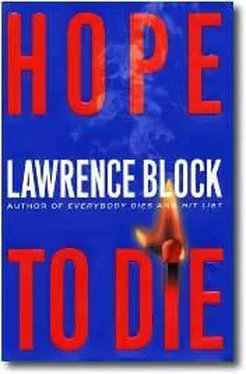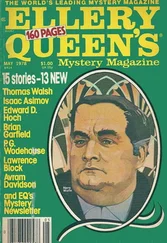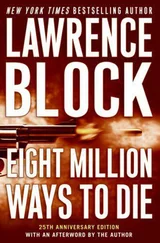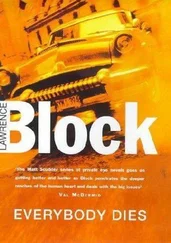
Lawrence Block
Hope to Die
Matthew Scudder 15
This one's for JOHN B. KEANE
Life is a narrow vale between the cold and barren peaks of two eternities. We strive in vain to look beyond the heights. We cry aloud- and the only answer is the echo of our wailing cry. From the voiceless lips of the unreplying dead there comes no word. But, in the night of Death, Hope sees a star, and listening Love can hear the rustling of a wing.
– Robert Green Ingersoll,
at the grave of his brother,
Ebon Clark Ingersoll,
June 1879
Hope is the only universal liar who never loses his reputation for veracity.
– Robert Green Ingersoll,
speaking at the
ManhattanLiberal Club,
February 1892
The author is pleased to acknowledge the considerable contribution of the Ragdale Foundation, inLake Forest, Illinois, where this book was written.
It was a perfect summer evening, the last Monday in July. The Hollanders arrived at Lincoln Center sometime between six and six-thirty. They may have met somewhere- in the plaza by the fountain, say, or in the lobby- and gone upstairs together. Byrne Hollander was a lawyer, a partner in a firm with offices in the Empire State Building, and he might have come directly from the office. Most of the men were wearing business suits, so he wouldn't have had to change.
He left his office around five, and their house was on West Seventy-fourth Street between Columbus and Amsterdam, so he had time to go home first to collect his wife. They may have walked to Lincoln Center – it's half a mile, no more than a ten-minute walk. That's how Elaine and I got there, walking up from our apartment at Ninth and Fifty-seventh, but the Hollanders lived a little further away, and may not have felt like walking. They could have taken a cab, or a bus down Columbus.
However they got there, they'd have arrived in time for drinks before dinner. He was a tall man, two inches over six feet, two years past fifty, with a strong jaw and a high forehead. He'd been athletic in his youth and still worked out regularly at a midtown gym, but he'd thickened some through the middle; if he'd looked hungry as a young man, now he looked prosperous. His dark hair was graying at the temples, and his brown eyes were the sort people described as watchful, perhaps because he spent more time listening than talking.
She was quiet, too, a pretty girl whom age had turned into a handsome woman. Her hair, dark with red highlights, was shoulder-length, and she wore it back off her face. She was six years younger than her husband and as many inches shorter, although her high heels made up some of the difference. She'd put on a few pounds in the twenty-some years they'd been married, but she'd been fashion-model thin back then, and looked good now.
I can picture them, standing around on the second floor at Avery Fisher Hall, holding a glass of white wine, picking up an hors d'oeuvre from a tray. As far as that goes, it's entirely possible I saw them, perhaps exchanging a nod and a smile with him, perhaps noticing her as one notices an attractive woman. We were there, and so were they, along with a few hundred other people. Later, when I saw their photographs, I thought they looked faintly familiar. But that doesn't mean I saw them that night. I could have seen either or both of them on other nights at Lincoln Center or Carnegie Hall, or walking in the neighborhood. We lived, after all, less than a mile apart. I could have laid eyes on them dozens of times, and never really noticed them, just as I very possibly did that night.
I did see other people I knew. Elaine and I talked briefly with Ray and Michelle Gruliow. Elaine introduced me to a woman she knew from a class she'd taken several years ago at the Metropolitan, and to a terribly earnest couple who'd been customers at her shop. I introduced her to Avery Davis, the real estate mogul, whom I knew from the Club of Thirty-one, and to one of the fellows passing the hors d'oeuvres trays, whom I knew from my AA home group at St. Paul 's. His name was Felix, and I didn't know his last name, and don't suppose he knew mine.
And we saw some people we recognized but didn't know, including Barbara Walters and Beverly Sills. The occasion was the opening of New York 's summer music festival, Mostly Mozart, and the cocktails and dinner were the festival's thank-you to its patrons, who had achieved that status by contributing $2500 or more to the festival's operating fund.
During her working years, Elaine made a habit of saving her money and investing it in rental property around town. New York real estate has been a can't-lose area even for people who do everything wrong, and she did most things right, and has done very well for herself. She was able to buy our apartment at the Parc Vendome, and there's enough income generated by her apartment houses in Queens so that, as far as money is concerned, neither of us needs to work. I have my work as a detective, of course, and she has her shop a few blocks south of us on Ninth Avenue, and we enjoy the work and can always find a use for the money it brings in. But if nobody hired me or bought paintings and antiques from her, we wouldn't wind up missing any meals.
We both like the idea of giving away a certain amount of what comes in. Years ago I got in the habit of stuffing ten percent of my earnings into whatever church poor box came along. I've grown a little more sophisticated in my giving since then, but I still find a way to get rid of it.
Elaine likes to support the arts. She gets to more operas and gallery openings and museum shows than I do (and fewer ball games and prizefights) but we both like music, classical and jazz. The jazz joints don't hit you up for contributions, they just call it a cover charge and let it go at that, but every year we write out a lot of checks toLincolnCenter and Carnegie Hall. They like to encourage us with perks of one sort or another, and this evening was one of them- drinks, a sit-down dinner, and complimentary orchestra seats to the opening concert.
Around six-thirty we went to our assigned table, where we were joined by three other couples, with whom we exchanged names and chatted amiably throughout the meal. If pressed, I could probably recall the names of most if not all of our table mates, but what's the point? We haven't seen them since, and they don't figure in the story. Byrne and Susan Hollander were not among them.
They were at another table, which I later learned was on the other side of the room from us. While I might have seen them earlier, it's unlikely that I laid eyes on them during dinner. Their seats for the concert were just two rows in front of ours, but at the extreme right of the center section, while we were toward the left. So, unless we bumped into each other on the way to the rest room during intermission, I don't suppose we would have seen them at all.
The meal was pretty good, the company at dinner pleasant enough. The concert was very enjoyable, and, true to its stated theme, leaned toward Mozart, including one of his piano concertos and the Prague Symphony. There was an orchestral suite of Antonín Dvorák's as well, and the program notes drew some connection between him and Mozart, or perhaps between him andPrague, Dvorák being aCzech. Whatever it was, I didn't pay too much attention to it. I just sat there and enjoyed the music, and when it was done we walked home.
Читать дальше













